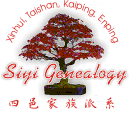

What is a generation name poem? There is no standard length nor format. Generally, however, it follows the traditional Chinese poem structures of grouping in 4's, 5's or 7's. The correct grouping will lend meanings to the poem. Starting in sequent with the first character each denotes a generation. The poem tumbles over and starts at the top again after reaching the end of the poem.
Why? In Chinese culture relationship or inherited position within the family is extremely important. Just by the salutation one person uses to address another their relation is evident. There is no need to add whether the aunt, uncle or cousin is maternal or paternal, younger or older. It is all in the salutation. Using the wrong salutation is considered not only as bad manner but more seriously as a lack of respect to the elder. It is then concluded that the parents failed to discharge their responsibilities properly.
Keeping track of who is who could be a major problem. Here is where the generation name poem comes in handy. When a male member gets married, he would take on an extra name, in our part of the country known as hao (íZíZíZ). It is makeup of the character in the poem that denotes his generation and coupled it with another character. From hereon in he should be addressed by his hao not his given name. To do otherwise is taken as a sign of disrespect. However, this practice of adopting a hao is a dying one. Another naming practice that has been stopped is the biaozi (ŔíĘňíZíZ) which was given at the same time as the child was named.
How is this biaogi chosen? There are no hard and fast rules. Some are extensions of the given names in term of meaning. However, it is not uncommon to have one that is opposite in meaning. Some would give the source of the character used in the given name. Some times it is a play on some famous person's name and/or biaogi. There were cases where it denoted the order of birth within the siblings.
What is still practice is to have members of the same generation sharing a common character in their given names. Some families segregate between male and female while others don't. In some families this extended to include a host of cousins while some just limited to the immediate members. Confusing? Of course!
In the West it is considered an honour to have a child name after a person. However, with the Chinese the opposite is true. This is called pihui (íZíZ┐ÚíZíZ). It is an old practice of avoid using the characters in the emperor's name in everything. This practice had created confusions through the ages because scholars had employed various methods to achieve this. One was the use of synonyms. Another was to omit a stroke of the character in question. Both method resulted in changes to the works of various writers. Thus the same work published in different era could have single word differences throughout. Still another method is to leave a blank space. Yes, more guess works for later day scholars. With the concise nature of the old writings, one word could mean the world of a difference.
The sidebar on the left are the generation name poems of the descendants of Lee Dong and his uncle Lee Ling Jiang. It reads left to right instead of the traditional Chinese format, top to bottom and right to left. I belong to the 24th generation. Some members of the 23rd generation are still among us. The oldest of the 24th generation are close to 80 if not over.
Included also are the eight characters of the Chow generation name poem that I know of. They represent the 19th to 26th generations. A point to note is some of the 21st generation used ň«íZ (Zhong) instead of ň«íZ (Jia).
We would like to thank Erwin Li for sending his family poems, the Lee Clan of Chao'an Xian Mei (ŠŻ«ňíZíZíZíZąŠ░┤ń╗íZšżíZíZíZíZíZíZíZŠ░íZ) to be included here. Erwin's family has two poems, an internal one and an external one. Currently he is researching